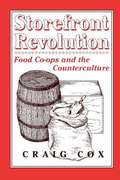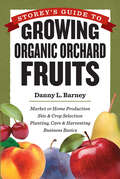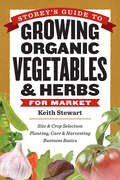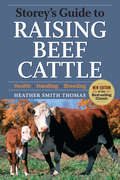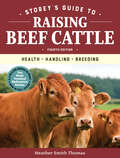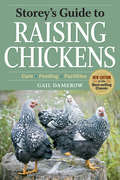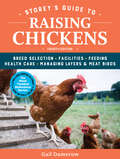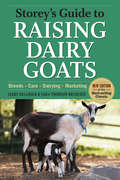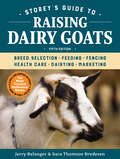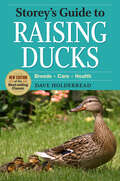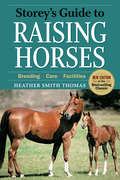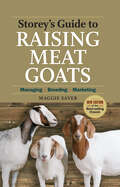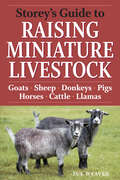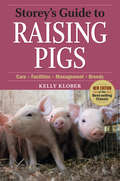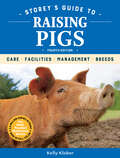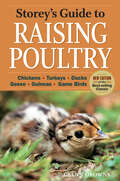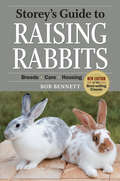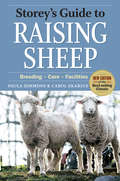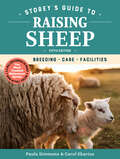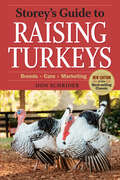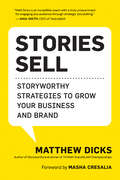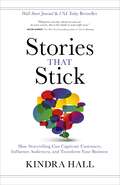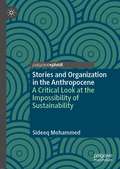- Table View
- List View
Storefront Revolution: Food Co-ops and the Counterculture
by Craig CoxThis book presents a detailed history of the food co-ops in Minneapolis in the 1970's.The co-ops gave activists a place where they could both express themselves and accomplish at least some small-scale changes.
Storey's Guide to Growing Organic Orchard Fruits: Market or Home Production * Site & Crop Selection * Planting, Care & Harvesting * Business Basics (Storey's Guide To Ser.)
by Danny L. BarneyDanny Barney covers everything you need to know to successfully grow and market your own organic orchard fruits. Offering expert tips on selecting the right site, choosing the best cultivars, designing and maintaining a sustainable orchard, and efficiently harvesting fruit, Barney also helps you develop a viable business plan, acquire necessary organic certifications, and identify niche markets for your products.
Storey's Guide to Growing Organic Vegetables & Herbs for Market: Site & Crop Selection * Planting, Care & Harvesting * Business Basics
by Keith StewartKeith Stewart covers everything you need to know to successfully grow and market your own organic vegetables and herbs. Offering expert tips on choosing a growing site, soil fertility, companion planting, irrigation, organic farming techniques, dealing with pests, and harvesting, Stewart also helps you design a business plan, manage employees, and find niche markets for your produce.
Storey's Guide to Raising Beef Cattle, 3rd Edition: Health, Handling, Breeding (Storey’s Guide to Raising)
by Heather Smith ThomasWhether you’re raising one cow or a herd, this comprehensive guide shows you everything you need to know to successfully manage your beef cattle operation. Heather Smith Thomas stresses the importance of understanding bovine behavior while covering breed selection, calving, feeding, housing, medical care, and humane slaughter practices. Along with in-depth information on raising grass-fed animals and dealing with toxic pasture plants, you’ll also find advice on creating a viable business plan and identifying niche markets for your beef.
Storey's Guide to Raising Beef Cattle, 4th Edition: Health, Handling, Breeding (Storey’s Guide to Raising)
by Heather Smith ThomasWhether a farmer is raising one cow or a herd, Storey&’s Guide to Raising Beef Cattle is the most reliable reference for ensuring a successful, healthy cattle operation. In this fully updated, full-color fourth edition, long-time cattle rancher and author Heather Smith Thomas explains every aspect of bovine behavior and provides expert guidance on breed selection, calving, feeding, housing, pasture, and health care. Along with in-depth information on raising grass-fed animals, there is also advice on creating a viable business plan and identifying niche markets for selling beef. This publication conforms to the EPUB Accessibility specification at WCAG 2.0 Level AA.
Storey's Guide to Raising Chickens, 3rd Edition: Care, Feeding, Facilities (Storey’s Guide to Raising)
by Gail DamerowGail Damerow shows you how to choose the right breeds for your needs, build efficient chicken coops, provide necessary medical attention for your animals, and much more. Whether you’re raising broilers for meat or preparing your chickens to win a blue ribbon at the next county fair, Storey’s Guide to Raising Chickens will help you achieve your poultry-raising goals.
Storey's Guide to Raising Chickens, 4th Edition: Breed Selection, Facilities, Feeding, Health Care, Managing Layers & Meat Birds (Storey’s Guide to Raising)
by Gail DamerowSerious poultry farmers and backyard bird raisers have relied on this best-selling reference for more than 20 years. The fourth edition of Gail Damerow’s comprehensive handbook is now completely revised and redesigned, making it more accessible and informative than ever. You’ll get the most up-to-date details on shelter, food, health care, eggs, chicks, and meat, and recent research into chicken behavior and communication makes the sections on flock management truly authoritative. New color photos and illustrations provide more specificity and information about chicken breeds, anatomy, and health.
Storey's Guide to Raising Dairy Goats, 4th Edition: Breeds, Care, Dairying, Marketing (Storey’s Guide to Raising)
by Jerry Belanger Sara Thomson BredesenA great choice for the small or backyard farmer, dairy goats require a smaller investment than cows and produce milk that makes delicious yogurt and cheese. This fourth edition includes more on pygmy goats, health care, breeding, and making dairy products. You’ll have everything you need to you need to know to successfully raise your own dairy goats.
Storey's Guide to Raising Dairy Goats, 5th Edition: Breed Selection, Feeding, Fencing, Health Care, Dairying, Marketing (Storey’s Guide to Raising)
by Jerry Belanger Sara Thomson BredesenThis best-selling handbook is packed with detailed information on housing, feeding, and fencing dairy goats. It’s been the trusted resource on the topic for farmers and homesteaders since it was originally published in 1975, and the new edition — completely updated and redesigned — makes Storey’s Guide to Raising Dairy Goats more comprehensive and accessible than ever. In-depth sections explain every aspect of milking, including necessary equipment, proper hand-milking techniques, and handling and storing the milk. New color illustrations show each stage of kidding, and substantial chapters on dairy goat health and breeding include the most up-to-date research and practices.
Storey's Guide to Raising Ducks, 2nd Edition: Breeds, Care, Health (Storey’s Guide to Raising)
by Dave HolderreadWith in-depth information on feeding, housing, behavior, and health care, this comprehensive guide also provides proven strategies for creating a profitable business plan and marketing your products. Whether you&’re about to acquire your first ducks or are interested in experimenting with rare breeds, Storey&’s Guide to Raising Ducks will help you achieve your duck-raising goals.
Storey's Guide to Raising Horses, 2nd Edition: Breeding, Care, Facilities (Storey’s Guide to Raising)
by Heather Smith ThomasRaising horses successfully requires good preparation, hard work, and a sincere interest in your animals’ well-being. With in-depth information on all aspects of horsekeeping, including grooming, foaling, housing, diet, exercise, and medical care, this comprehensive guide covers everything you need to know to raise healthy and happy horses.
Storey's Guide to Raising Meat Goats, 2nd Edition: Managing, Breeding, Marketing (Storey’s Guide to Raising)
by Maggie SayerDiscover how raising your own meat goats can be a fun and profitable endeavor. Offering plenty of tips for creating an economically viable operation and identifying niche markets for your products, Storey&’s Guide to Raising Meat Goats shows you how to care for a thriving and productive herd full of healthy and happy animals.
Storey's Guide to Raising Miniature Livestock: Goats, Sheep, Donkeys, Pigs, Horses, Cattle, Llamas (Storey’s Guide to Raising)
by Sue WeaverWhether you want to the make most of a small plot of land or add diversity to a large farm, raising miniature livestock can be a fun and profitable experience. With expert advice on choosing a breed that suits your needs, Sue Weaver shows you how to house, feed, and care for miniature goats, sheep, donkeys, pigs, horses, cattle, and llamas. You’ll be inspired by profiles of successful breeders as you learn everything you need to know to keep your miniature livestock healthy and productive.
Storey's Guide to Raising Pigs, 3rd Edition: Care, Facilities, Management, Breeds (Storey’s Guide to Raising)
by Kelly KloberLearn how to successfully raise your own pigs. Stressing the importance of sustainable and environmentally friendly farming practices, Kelly Klober provides expert tips on making your hog operation more efficient and profitable. Storey’s Guide to Raising Pigs will give beginners the confidence they need to succeed, while inspiring experienced farmers to try new techniques and experiment with new breeds.
Storey's Guide to Raising Pigs, 4th Edition: Care, Facilities, Management, Breeds (Storey’s Guide to Raising)
by Kelly KloberFarmer Kelly Klober provides expert advice on making any size hog operation more efficient and profitable in Storey’s Guide to Raising Pigs. The most comprehensive book available on the topic, this fourth edition features the most up-to-date information and practices, illustrated with color photography. Sustainable and environmentally friendly farming practices are stressed. Both beginners and experienced farmers will find all the information they need to select, house, care for, breed, and butcher pigs, along with marketing advice. This publication conforms to the EPUB Accessibility specification at WCAG 2.0 Level AA.
Storey's Guide to Raising Poultry, 4th Edition: Chickens, Turkeys, Ducks, Geese, Guineas, Game Birds (Storey’s Guide to Raising)
by Glenn DrownsWhether you’re running a farm or interested in keeping a few backyard birds, Storey’s Guide to Raising Poultry covers everything you need to know to successfully raise your own chickens, turkeys, waterfowl, and more. Stressing humane practices throughout, Glenn Drowns provides expert advice on breed selection, housing, feeding, behavior, breeding, health care, and processing your own meat and eggs. With tips on raising specialty species like doves, ostriches, and peafowl, you’ll be inspired to experiment with new breeds and add diversity to your poultry operation.
Storey's Guide to Raising Rabbits, 4th Edition: Breeds, Care, Housing (Storey’s Guide to Raising)
by Bob BennettWhether you’re interested in raising rabbits for show, meat, fur, or as pets, this comprehensive guide covers everything you need to know to keep your animals healthy and productive. Offering expert advice on breed selection, housing, feeding, humane handling, routine medical care, and dealing with diseases, Bob Bennett also provides tips on how to make raising rabbits a financial lucrative endeavor. Storey’s Guide to Raising Rabbits will help both the commercial producer and the backyard fancier achieve their rabbit-raising goals.
Storey's Guide to Raising Sheep, 4th Edition: Breeding, Care, Facilities (Storey’s Guide to Raising)
by Paula Simmons Carol EkariusDrawing from years of hands-on experience, Paula Simmons and Carol Ekarius provide expert advice on breed selection, lambing, feeding, housing, pasture maintenance, and medical care. You’ll also find tips on profitably marketing your meat and fiber products, as well as information on obtaining organic certifications.
Storey's Guide to Raising Sheep, 5th Edition: Breeding, Care, Facilities (Storey’s Guide to Raising)
by Paula Simmons Carol EkariusStorey’s Guide to Raising Sheep is the best-selling, most trusted reference for farmers and backyard homesteaders with any size flock. The fifth edition is now updated with full-color illustrations and photographs throughout, including a gallery of the best breed choices for both meat and fiber. With their small size and gentle dispositions, sheep are one of the easier livestock species to raise and offer varied marketing opportunities, including meat, wool, and milk. Detailed instructions and graphics lead readers through every essential procedure, including shearing, building a lambing shed, breeding and lambing, butchering, and marketing. This publication conforms to the EPUB Accessibility specification at WCAG 2.0 Level AA.
Storey's Guide to Raising Turkeys, 3rd Edition: Breeds, Care, Marketing (Storey’s Guide to Raising)
by Don SchriderTurkeys are an excellent source of succulent meat, rich eggs, and nutrient-dense manure, and raising them is a rewarding and profitable activity for many farmers. With helpful tips on acquiring organic certification, processing both meat and eggs, and marketing your products, you’ll have all the information you need to successfully raise your own healthy and productive turkeys.
Storied Independent Automakers: Nash, Hudson, and American Motors
by Charles K. HydeWith roots extending back to the first decade of the twentieth century, Nash Motor Company and the Hudson Motor Car Company managed to compete and even prosper as independent producers until they merged in 1954 to form the American Motors Company, which itself remained independent until it was bought in 1987 by the Chrysler Corporation. In Storied Independent Automakers, renowned automotive scholar Charles K. Hyde argues that these companies, while so far neglected by auto history scholars, made notable contributions to automotive engineering and styling and were an important part of the American automobile industry. Hyde investigates how the relatively small corporations struggled in a postwar marketplace increasingly dominated by the giant firms of Ford, General Motors, and Chrysler, which benefited from economies of scale in styling, engineering, tooling, marketing, and sales. He examines the innovations that kept the independents' products distinctive from those of the Big Three and allowed them to survive and sometimes prosper against their larger competitors. Hyde also focuses on the visionary leaders who managed the companies, including Charles Nash, Roy D. Chapin, Howard Coffin, George Mason, George Romney, and Roy D. Chapin Jr., who have been largely unexamined by other scholars. Finally, Hyde analyzes the ultimate failure of the American Motors Company and the legacy it left for carmakers and consumers today. Storied Independent Automakers is based on extensive research in archival collections generated by the three companies. Residing in large part in the DaimlerChrysler Corporate Collection, these sources have been seldom tapped by other scholars before this volume. Auto historians and readers interested in business history will enjoy Storied Independent Automakers.
Stories Sell: Storyworthy Strategies to Grow Your Business and Brand
by Matthew DicksWIN CUSTOMERS AND BUILD BRANDS THROUGH THE POWER OF STORYTELLING Moth GrandSLAM all-time champion storyteller, writer, and business coach Matthew Dicks presents a guide to using the power of storytelling for success in business of any type or size. Matt has found that the basic principles of effective storytelling are universal, teachable, and more crucial than ever for business communication. Jam-packed with examples, Stories Sell reveals the ingredients of a compelling story and then demonstrates how they can be incorporated into persuasive marketing copy, productive face-to-face conversations, effective sales pitches, and presentations that people actually want to hear. Topics include: • The three elements of a winning story: stakes, suspense, and surprise • Finding the right narrative structure (and why beginning at the beginning isn’t always the best method) • The power of being vulnerable: how admitting your mistakes can build rapport with audiences • When and how to use humor • Zigging while others zag: making yourself stand out from competitors Whether you’re an online marketer, advertising professional, salesperson, small business owner, independent contractor, or Fortune 500 executive, Stories Sell will teach you to find your voice and get your message across for maximum impact and profit.
Stories That Stick: How Storytelling Can Captivate Customers, Influence Audiences, and Transform Your Business
by Kindra HallThe moment you take control of your stories, you take control of your business and your life.You keep hearing how story is the latest-and-greatest business tool, and that storytelling can do everything—from helping leaders better communicate to motivating sales teams and winning customers away from competitors.But what stories do you need to tell? And how do you tell them?In Stories That Stick, Kindra Hall, professional storyteller and nationally-known speaker, reveals the four unique stories you can use to differentiate, captivate, and elevate:the Value Story, to convince customers they need what you provide;the Founder Story, to persuade investors and customers your organization is worth the investment;the Purpose Story, to align and inspire your employees and internal customers; andthe Customer Story, to allow those who use your product or service to share their authentic experiences with others.Telling these stories well is a simple, accessible skill anyone can develop. With case studies, company profiles, and anecdotes backed with original research, Hall presents storytelling as the underutilized talent that separates the good from the best in business. She offers specific, actionable steps readers can take to find, craft, and leverage the stories they already have and simply aren’t telling.Every person, every organization has at least four stories at their disposal. Will you tell yours?
Stories and Organization in the Anthropocene: A Critical Look at the Impossibility of Sustainability
by Sideeq MohammedThis book is about the stories being told in the Anthropocene. Stories of irreparable damage being done to the global ecosystem, of sustainable growth, of dystopian collapse, of continued interspecies flourishing, of Gaia, and of accelerating capitalism’s dynamics in order to discover its outside. Stories of change. Stories of hope. Against them all, this book seeks to braid together a particular thread of storying in order to speak to the emergence of the mall at the end of the world; a space where a new politics of “spectral capitalism” is played out. In doing so, we reflect that there never was any outside to Capital, that it can live forever, its performances and spectacles being preserved despite global ecological collapse. This book seeks to understand the nascence of the mall at the end of the world and the new people, thoughts, and dreams that come with it.
Stories for Management Success: The Power of Talk in Organizations (Routledge Focus on Business and Management)
by David CollinsWe tend to assume that we may divide our activities into talk and action. In so doing we tend to suggest that talk is subordinate to action. Taking issue with these presumptions, Stories for Management Success: The Power of Talk in Organizations argues that talk is central to what managers do. Indeed it argues that, for managers, ‘walking the walk’ necessarily implies ‘talking the talk such that storytelling is now central to managerial work’. Noting that managerial talk is increasingly located within an account of storytelling the book offers a critical review of the academic debates associated with telling tales at work and uses this critical reflection to shape and guide those who would realise the power of talk. Thus, the book concludes with six key questions designed to prompt both introspection and action on storytelling in an organized context. With reflections on the relevant management research, the author provides a scholar's digest to aid management thinking and practice. This book offers an examination of the processes of organizational storytelling and has been designed to allow practitioners of management to recognise and in so doing to unleash the power of talk in organizations.
